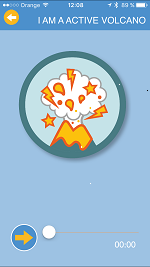- Peaceful Sleep is an app based on mindfulness and meditation that helps children fall asleep and relax.
- It teaches them to calm their minds following very simple steps.
- Helping our children have a calm mind is the best gift we can give them. It allows them to live and face their problems from a different perspective, giving them resources that will be useful to them throughout the rest of their life.
- The app includes exercises to help children in moments of anger or frustration and be grateful for the good things in life.
No matter how tired they are, children will sleep better when they relax their mind, something that they can achieve through meditation adapted to their age.
Peaceful Sleep is an app with meditations and exercises adapted to children so that they can, as well as sleep better, react calmly when feeling angered or frustrated.
The meditation exercises in Peaceful Sleep aim to take the attention away from any thought, calming the mind and focusing the attention on the breathing, the body or the sounds. Accepting the feelings of anger and frustration calmly or being conscious of the joy that being grateful can be are behaviours that are not taught explicitly anywhere but can condition our adult life. If they are learned during childhood, they can help children face without trauma many of the situations that they will go through during their life.
If life is the color of the glass that we look through, a calm mind gives is the best glass we can imagine.
The app includes the following exercises/meditations:
By relaxing every part of the body we can help children calm their mind and fall into a pleasant sleep.
- The treasure hunt
This is an exercise or meditation that takes the attention away from the thoughts and focuses on the breathing until the child relaxes and finds peace. Carrying out this exercise often will enable the child to calm down at will.
- I’m a volcano
This teaches the child to accept feelings like anger and frustration with peace and calmness, without stress or negative thoughts.
- I don’t want to be grumpy
This is a guided meditation exercise to show children that complaining about things that have no solution will not help in any way and that being grateful, on the other hand, will help them feel much better.
There have been many studies on the positive effects of meditation on children. Among them, it is worth highlighting the one carried out in Visitacion Valley Middle School (San Francisco, USA) that is applying the “Quiet Time” program, which consists in incorporating meditation in the student’s routine.
The children participating in this program meditate two times a day for 10 minutes. Six years after the beginning of this practice, the student’s results have experimented a considerable improvement. The first year, failed exams fell by 45% and during the first four years, the average failure rate was among the lowest in the city of San Francisco. The exam results improved considerably and close to 20% of the students were admitted into the Lowell High School, something very unusual before the implementation of this program.
According to a poll carried out by the California government, the students from this school registered the highest happiness levels between the schools used in the study, which has undoubtedly contributed to the program being implemented in different schools in that state.
In another study carried out in a school in New Haven (Connecticut), the levels of cortisol, a stress hormone, were reduced after giving meditation lessons three times a week.
Meditation is associated with a better cognitive and emotional development in children and it brings them considerable benefits that help construct a healthier and more intelligent society. As the Dalai Lama once said: “If every 8-year-old in the world is taught meditation, we will eliminate violence from the world within one generation.”
Scientific studies have corroborated in these last years the multiple physiological benefits that 10 minutes of daily meditation can have on our body:
- Reduces cortisol levels (a hormone released with stress).
- Reduces blood pressure.
- Improves the immune system.
- Increases melatonin production.
- Increases attention span.
- Decreases depression and irritability.
Even though the practice of meditation is associated with an adult age, its benefits can be greater when its practice begins during childhood. This is because children will learn to find peace and calm down in the different situations they might face. It helps find the wellbeing throughout their life and improve their learning capacities in other disciplines while helping them become balanced and happy adults.
For the Buddhists, happiness is a feeling of profound serenity and fulfillment, a state that can be reached with the help of meditation. Meditation can, therefore, determine the feelings of happiness or peacefulness and well-being that we experience throughout our life. We dedicate a lot of time studying in preparation for our future, exercising to keep our bodies healthy, taking care of our house so that it is cozy, but we do not give our well-being enough attention.
Web:
SPANISH: http://www.hacialacalma.com/duermetranquilo/
ENGLISH: http://www.hacialacalma.com/peaceful-sleep/
App Store (Apple):
SPANISH: https://itunes.apple.com/es/app/hacia-la-calma/id1125722142?mt=8
ENGLISH: https://itunes.apple.com/en/app/hacia-la-calma/id1125722142?mt=8
Google Play:
SPANISH: https://play.google.com/store/apps/details?id=com.duermetranquilo&hl=es
ENGLISH: https://play.google.com/store/apps/details?id=com.duermetranquilo&hl=en


